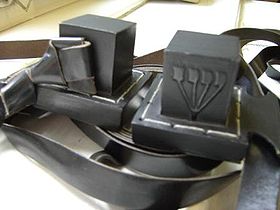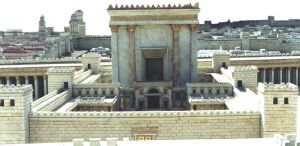 Every fruit of the ground that you bring in from your Land… This week’s Sedra starts with the mitzvah of the Bringing of the First Fruits (Bikurim) to the Temple. By fulfilling this mitzvah of bringing the first of our crops for sanctification in the Bet Hamikdash, we confirm our belief that the Land of Israel and its produce belongs to G-d, and we express our gratitude to Him. As well as this, we bring these fruits as a sign of submission to Him, so that we will know that we are no more than the workers of the land, and that we must bring the best portion to the Owner. This can be explained with a nice little Midrash: “Let the first bring the first to the first to the first place to the First of all”. What does all this mean? Let’s take it stage by stage: ‘Let the first’ – the Jewish people. We were the first to believe in Hashem. At this point, Moshe has completed the review of the Torah, and was speaking to Israel on the day before his death. G-d tells him to set up twelve tremendous stones on the borders of Israel. They were to have the whole of the Torah in seventy different languages inscribed on them. There are several reasons for this. Firstly, the gentile nations needed an opportunity to learn it. Had they read the inscription and observed the Seven Noahide Laws, they would have been able to stay in Israel. However, Hashem didn’t want us to expose the Torah directly to the non-Jews, so he ordered that the writing be covered with plaster. He then gave the non-Jews the wisdom to peel the plaster off and expose the writing underneath. Additionally, these stones were to show everyone that the Jews had come to Israel not as foreign conquerors but as commanded by G-d. They also signified that one was about to enter the land of the Torah. Just as a Jewish home has a mezuzah, so these stones were to remind the traveller that the purpose of living in Israel is to keep the Torah. If only we would realise this! The parsha continues with Moshe saying the Divine Blessings and the Divine Reproof. We are told that if we keep the Torah fully, Hashem will free us from material worries and bless us with the necessities to perform more mitzvot. Conversely, if we neglect the Torah, Hashem will punish us with hardships and limit our abilities to perform the mitzvot. This way we are able to see from our situations whether or not we are on the right path. At that time, the earth shook, the heavens trembled, the sun and moon darkened, the stars lost their shine, the forefathers cried out from their graves, the creatures became silent, and the branches of the trees no longer swayed. The forefathers cried ‘ How will our children be able to bear these punishments? Perhaps they will perish, for they won’t have enough merits to shield them and nobody will pray on their behalf!’ A Heavenly Voice cried ‘Do not be afraid. The oath that I swore to you will not be voided, and it will protect them [the Jews]’. Further to this, Moshe explained ‘Hashem’s curse will only take effect if you do not keep the mitzvot [i.e. it is your choice to prevent it]’. Still, to the ordinary person like me, these punishments seem a trifle harsh. Moshe then carries on by telling us that these punishments are on a measure-for-measure basis: · If you don’t want to serve Hashem, you will serve non-Jews We can see from here that Hashem punished even those who performed the mitzvot – because they didn’t perform them with joy. We should all take a lesson from this. Next time we give charity, walk a lady across the road, visit someone in hospital or get invited to a wedding, we should realise that we are doing G-d’s Will and are in fact causing him pleasure. That should be enough for any Jew to perform these mitzvot with joy! Moshe continued to speak to the assembled Jews, men, women and children. He impressed upon them ”Many among you personally witnessed the great miracles Hashem performed in Egypt. All the years in the wilderness you angered G-d by testing and challenging Him. You did not sufficiently understand and appreciate His great acts of kindness. Now, after forty years of training and teaching, you should be able to fully grasp G-d’s wisdom, and to understand that your success lies in keeping the Torah and the mitzvot. Therefore, in the future, heed the words of this covenant – the Blessings and the Reproof. Then you will surely succeed.” Returning to the commandment to bring the First Fruits, the verse continues: “And you shall rejoice in all the good which the Lord your G-d has given you”. On a simple level, this can mean that we should consider anything that Hashem has given us, whatever the value, as precious. It can also mean that we should be grateful for everything that he gives us, and thank Him accordingly. I would like to demonstrate both these lessons with two stories: Many years ago, there was a gentile king who lived in a far distant land. He ruled over many provinces, and had many ministers. All his ministers were gentiles with one exception, Mendel. He was the king’s favourite minister and he was trusted with many important duties. Everything was not so well in the palace, though, as the gentile ministers grew jealous of Mendel, and schemed a plan to get rid of him. They knew that he was an observant Jew and diligently kept Shabbat. The king was holding a big banquet to celebrate his daughter’s wedding to a handsome prince from a distant land, and everyone from the king’s court was invited. The plan was that the ministers would pass around a box of the king’s cigars around the royal table, and when Mendel would refuse to smoke (because of Shabbat) they would complain to the king that Mendel was being rebellious. They knew that the king had a hot temper and would have Mendel executed on the spot. The time for the banquet came, and sure enough, the cigars went around. Mendel was surprised when the box reached him. He wondered what to do. The gentile ministers were delighted when they saw Mendel discreetly take a cigar and put it in his pocket. They immediately ran to the king, saying that Mendel refused to smoke the king’s royal cigars, and was thus rebelling against his generosity. They were even more delighted when the king flew into a rage and demanded to see Mendel immediately. The giggling ministers retreated to a corner to ‘watch the fun’. The king flared out at Mendel. ‘How dare you shame and embarrass me in front of my court! Why do you refuse to smoke my royal cigars? Do you wish to make sport of me? I shall hang you from the highest gallows!” Mendel’s reply was short and calmly spoken. “Your majesty, I have been given a cigar from the king himself. What should I do – smoke it like the others did, or take it home to treasure on my mantelpiece?” The king was so impressed that he quickly apologised to Mendel, and had the other ministers executed! What do we learn from this story? Whatever Hashem, the King of all kings, gives us should be considered great and precious in our eyes. We should also realise that He gives us everything. Here is the second story to demonstrate this: Last Thursday I came home from yeshiva in the afternoon to discover that my wife was not at home. I looked for a note, but couldn’t find one. Knowing that my wife is always careful to let me know where she is, I became a little worried. However, I assumed that she had gone shopping and had forgotten, and I returned to yeshiva. On my return in the evening, some hours later, I discovered that she still hadn’t returned. At this stage I started to worry – after all, Jerusalem is a dangerous place. I made several phone calls, but nobody had seen her. I ran up to the neighbours, but none of them had seen her. It was getting late. I was now in a panic, and I mentally decided to go back to the apartment to think what to do. When I returned, I saw a man and a woman standing outside the door. I did not recognise them. The woman came up to me and asked me “Are you Shelley Kelaty’s husband?” My heart flew into my mouth. You can imagine what went through my mind. Have these people come to tell me that my new wife of five months has been taken ill? Injured in a bombing? Worse things went through my mind, and those few seconds (that seemed like hours) before I could compose myself were agonising. I knew I should have been kinder to her! I should have loved her much more that I did! Why didn’t I appreciate her! I barely managed a reply – “y-yes”. The lady looked me in the eye and said “Oh good. Can you tell her that we can’t come round this Shabbat, but will try and make it next week?” Shelley turned up safe and sound some minutes later. She was detained at work, and she had tried calling, but our phone was out of order. If only we could think such endearing thoughts about our loved ones when we are not fearing for their lives! SHABBAT SHALOM |





